UC San Diego Coach Matt Ustaszewski on making waves at the Paris Olympics
Share This Article
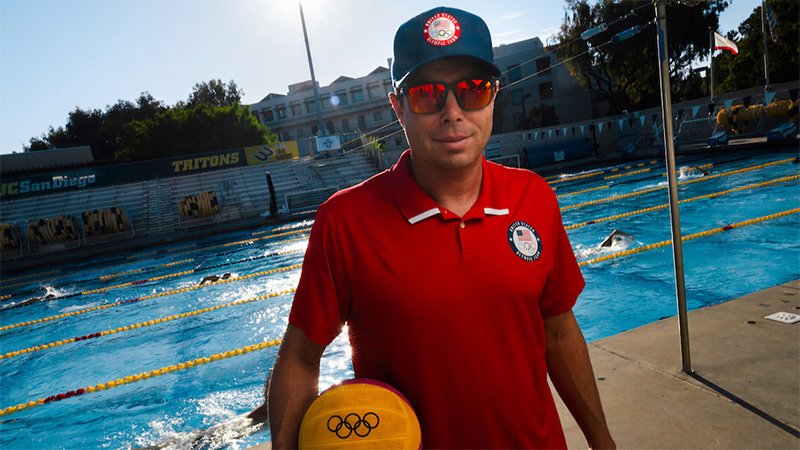
By Amanda Rubalcava, UC San Diego
As the world’s top athletes gathered to compete at the Paris 2024 Olympics, the spotlight and pressure wasn’t just on those facing off during the matches, but on the leaders guiding them to greatness. Among them was UC San Diego men’s water polo head coach Matt Ustaszewski, who was selected as the assistant coach of the U.S. men’s water polo team. The experience marked his second Olympic coaching stint, where he contributed to the team’s achievement of a bronze medal — the fourth bronze medal in program history.
After his return from the electrifying atmosphere of Paris, Matt Ustaszewski sat down with UC San Diego Today to reflect on the journey that led the team to the podium, offering insights into the tournament and the exciting moments that made the Olympics unforgettable.
Congratulations on securing the bronze medal at the Paris 2024 Olympics! How does it feel to have achieved this milestone?
The big feeling is a sense of accomplishment for the guys who have dedicated so much of their lives to this moment. For many of them, their dream was to win a medal at the Olympics. We felt like we had the potential, and a lot of it comes down to executing in the moment and also staying focused on being together. We were a really close-knit group, from the staff to the players, and there are no guarantees that when you put the time in you’ll be rewarded. For them to experience this and to connect in a way that becomes a special legacy for their group is really fulfilling. You can’t always control the results, but the effort, dedication and commitment were evident.
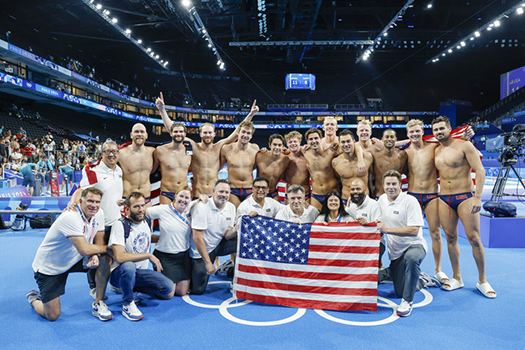
Did your Olympics experience in Paris differ from your experience at the Tokyo 2020 Olympics?
There were tons of differences—for example, the environments were polar opposites. In Tokyo, there were no spectators [because of the pandemic], while in Paris, we played in some incredible venues in front of many spectators. Our first venue was a great water polo venue for our group games, and then we competed in front of 15,000 people at the La Défense Arena, which is a massive stadium where Taylor Swift had a concert just a month before the Olympics.
Fortunately, 10 of the 13 guys from the Tokyo Olympics returned for this year’s events, so they had the experience to understand this would be different. They were able to teach the new guys about expectations and how to handle the situation. My roles were also totally different. In Tokyo, I was responsible for video analysis—I filmed 40 games in 16 days, wrote scripts and codes for game analysis and worked on scouting reports. In Paris, I was on the bench as one of the three coaches, helping with preparations, in-game adjustments and keeping the team focused.
Are there any unique aspects of the Olympics that readers might find surprising to learn?
Something people might not know is that not everyone at the Olympics stays for the entire duration; many athletes and teams come and go. From a water polo perspective, our matches span the full 16 days of the Olympics. While some sports conclude after their events, water polo continues until the very end, with the most meaningful games at the conclusion.
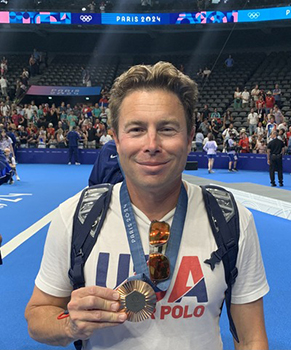
Another thing is that the Olympic village is enormous. Team USA has so many athletes that we could almost have our own village! The village covers about six square blocks, with high-rise buildings designated for each country. It takes over a massive plot of land and feels like its own little city.
Looking back, what inspired you to pursue a career in coaching water polo?
That’s a good question. I played water polo at UC San Diego for head coach Denny Harper, who instilled a love and passion for the sport. It was really fun to play water polo for Denny, and even after graduation, my teammates still enjoyed playing together at the club level. Water polo is physically demanding, and many people often don’t want to continue playing once their college career ends, but we kept going. Our ongoing love and passion for the game are a testament to Denny’s influence.
I also wanted to give back to younger generations by sharing that same passion and love for the game. At UC San Diego, we try to pass this message along, encouraging our athletes to play water polo for the rest of their lives. It’s a sport that can be continued as you get older because it’s not land-based, making it easier on the joints.
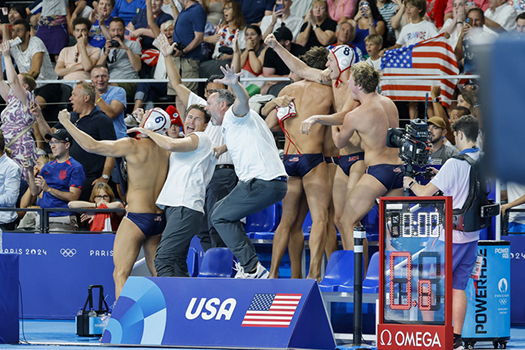
If you were to give advice to a collegiate water polo player aspiring to reach the Olympic stage, what would it be?
The most important thing is to seek out high-level opportunities. We put our players in the best position by scheduling the toughest competition in the country, making sure they’re competing at the highest level every season. If they want to pursue the national team route, we support that and find opportunities for them to be involved with the national team program.
After graduation, the most important step is to play professionally in Europe. The majority of Olympians that you’ll see competing at the highest level are typically in their 30s, because experience is really valuable and critical. Since there’s no professional league in America, going to Europe is a mandatory experience because you won’t be able to continue to develop at the highest level without the competition.
Beyond earning the bronze medal, what has been your favorite memory or experience of the 2024 Paris Olympics?
Winning a bronze medal was obviously a highlight, but the quarterfinal match with Australia was really critical. Getting into the top four and knowing that you have a chance to compete for a medal was definitely a highlight.
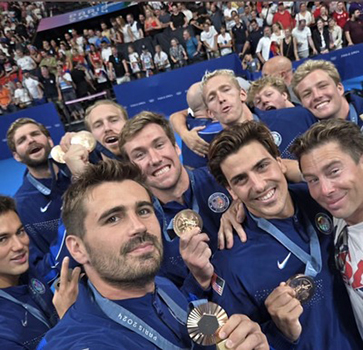
My wife also got to come out to some of the games. She’s been incredibly supportive of this journey and is a UC San Diego alum as well—she was the captain of the women’s soccer team. Many times I had to go away for national team duties to places like Georgia or Chengdu, China, where she couldn’t join me. So, having her come to our games against Italy and Romania, along with my sister and brother-in-law, was really memorable. That was definitely a highlight for me—being able to share this experience with them.
If you had to describe this year’s Olympic experience in just three words, what would they be?
“Expectation meets opportunity.”
While the rest of the world didn’t think that the United States were medal contenders, all of our players and staff members had the expectations that we were going to Paris to achieve something incredible. But nothing is guaranteed in sports, so when the opportunity presents itself to reach your goals, the trust in oneself and each other was what allowed our team to exceed the expectations of those outside our group.
Finally, in your opinion, what makes a great sportsman or competitor?
The two words that come to mind are commitment and dedication. All of these athletes have made tremendous sacrifices to get here. For instance, they’ve had to move from the United States to play professionally in Europe, often leaving their families and putting their careers on hold. For example, local San Diegan Alex Bowen, who was one of our leading scorers, has moved frequently to play water polo—from Bucharest to Belgrade, to Greece, and beyond. His long-term goal was to win an Olympic medal, and seeing him finally on the podium was super special.
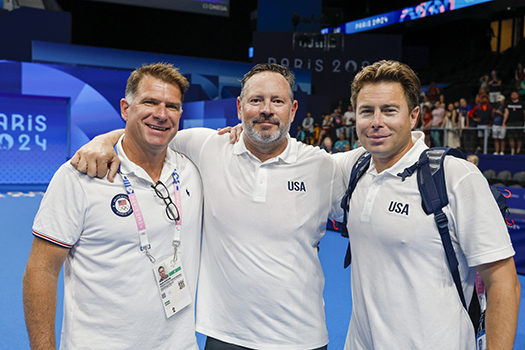
Further, the commitment and dedication to sacrifice individual skills and talents for the sake of the team. Some players didn’t play in roles that showed off their best abilities but filled roles that were crucial for our team’s success. These two qualities are prime examples of what it takes to succeed at this level.
